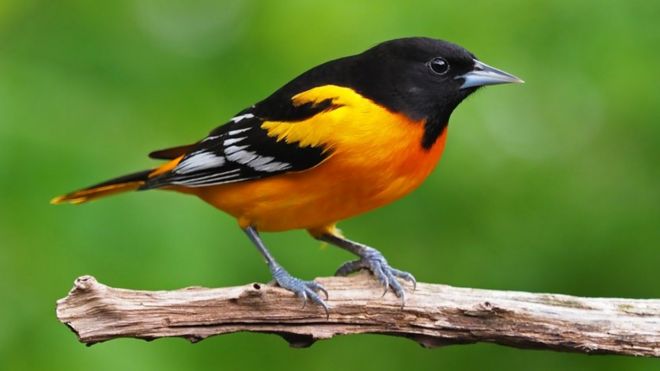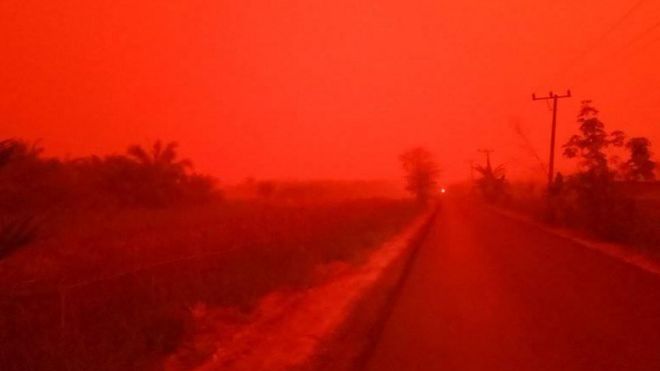
North America has lost more than a quarter of its birds since 1970
Bird populations in Asia and the US are "in crisis", according to two major studies.
The first concludes there are three billion fewer birds in the US and Canada today compared to 1970 - a loss of 29% of North America's birds.
The second outlines a tipping point in "the Asian songbird crisis": on the island of Java, Indonesia, more birds may now live in cages than in the wild.
Scientists hope the findings will serve as a wake-up call.
The two studies are published in the journals Science and Biological Conservation.
The caged bird trade could be worth tens of millions of dollars to the Indonesian economy
How have three billion birds disappeared?
Birds are declining in every type of habitat, from grasslands to deserts
The North America study revealed how many birds were being lost across every type of habitat - from grasslands to coasts to deserts. While it did not directly assess what was driving this, the scientists concluded that, among multiple causes, the major factor was habitat loss driven by human activity.
This study, explained lead researcher Dr Ken Rosenberg from the Cornell lab of Ornithology and the American Bird Conservancy, was the first to "run the numbers" on bird populations.
"We knew some species were declining," he told BBC News, "but we thought that, while rare birds were disappearing, the more generalist birds - and those better adapted to human landscapes - would be filling in the gaps."
The team's calculations were based on bringing together all the bird monitoring in North America for the past 50 years - every major survey carried out across the continent since 1970.
"What we saw was this pervasive net loss," Dr Rosenberg said. "And we were pretty startled to see that the more common birds, the everyday backyard birds and generalist species, are suffering some of the biggest losses."
That same pattern, he added, is likely to be mirrored in other parts of the world. And the situation in Asia, as the other study has shown, is a particularly striking case of a human-driven extinction crisis.
What is the songbird trade?
Bird singing competitions are hugely popular in Indonesia
The buying and selling of songbirds - many of which are caught from the wild - is huge business in parts of Asia, particularly on the island of Java in Indonesia.
Back in 2017, we investigated how the trade pushed more than a dozen species to the brink of extinction
Around 75 million birds are kept as pets on Java. Many are sought after for bird singing competitions - often referred to as "Kicau-mania". At these events, caged birds' songs are judged on melody, duration and volume. Top prizes for the best singers can earn owners as much as £40,000 in the biggest contests.
This culture, however, drives the capture of birds from the wild to satisfy demand. And that, researchers say, threatens the survival of numerous species.
Harry Marshall, lead researcher on this study, explained: "The trade is estimated to be worth tens of millions of dollars to the Indonesian economy, so it is no surprise that it is a key regional source of both supply and demand for songbirds, with hundreds of markets running across the archipelago, selling more than 200 different species."
Mr Marshall, who is a PhD student at Manchester Metropolitan University and Chester Zoo, led a survey of 3,000 households across Java, which is Indonesia's most densely populated island. From this, he and his colleagues were able to estimate that there were as many as 75 million caged birds living in Javanese households.
There may now be more songbirds living in cages on the island than there are now living in the wild.
What can be done to reverse these declines?
Both teams of scientists were keen to highlight the optimism among the obvious "doom and gloom" in these new findings.
Prof Stuart Marsden, from Manchester Metropolitan University - an authority on the Asian songbird trade - pointed out that the national obsession with keeping caged birds in Indonesia was driven by a love of birds.
"I think that passion can be channelled into conservation," he said.
Dr Rosenberg pointed to a striking example of bird conservation success as a reason for what he called his "weirdly optimistic" view about the dramatic decline in North America's bird population.
"In US and Canada, it was the duck hunters who noticed a decline in waterfowl and did some thing about it. Millions of dollars have been put into wetland protection and restoration - in order to have healthy populations for duck hunters.
"That's a model - if we can replicate it for birds that are not hunted and birds that people love in other habitats, we know that bird populations can be resilient and will come back."
Link to Article - Photos:
https://www.bbc.co.uk/news/science-environment-49744435




















 lived wild and free on the plains of Africa. He was head of two prides, protector of his families and the king of Zimbabwe’s Hwange National Park
lived wild and free on the plains of Africa. He was head of two prides, protector of his families and the king of Zimbabwe’s Hwange National Park


